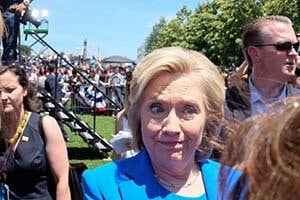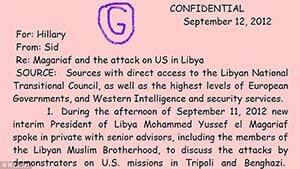
The Hillary Clinton email probe has hit a major nerve - even with her own party members...
In March, the 2016 presidential election hopeful's favorability was 78% among Democrats, according to The Washington Post. That number dropped to 72% by June - right around the time the email scandal heated back up, thanks to Congressional Republicans' release of 200 pages of emails that Clinton should have made public herself. Now, two months later, Clinton's Democratic favorability is down to 63%, according to Publicpolicypolling.com on Aug. 25.
As more and more damning details emerge, the less the public - even those affiliated with her party - trust her.
You see, the email scandal isn't a gaffe that can be easily looked past, explained away, and forgotten. It's more akin to a classic relationship deal-breaker - like differences of religion, or whether both partners want children, etc. - because it cuts deeply to the heart of two possibly inexcusable characteristics in a candidate.
First, this email scandal warns how the former first lady and secretary of state is capable of abusing the expanded powers afforded to the President of the United States.
Second, many voters consider Mrs. Clinton's disregard for federal rules and subsequent lack of transparency arrogant, as if to say, "I'm above the law."
Here's a look at the Hillary Clinton email investigation timeline that is dragging the 2016 presidential candidate from her party's top spot...
The Progression of the Hillary Clinton Email Scandal
- Jan. 13, 2009: Clintonemail.com went live. The domain, set up by Clinton's aides, provided individuals close to Mrs. Clinton with web addresses (i.e. [email protected]) so that they could maintain communication with her in private. However, Clinton used her account to tend to affairs ranging from U.S. State Department matters, to organizing her daughter's wedding, to contacting organizations to which the Clintons donated money.
- March 2013: The former first lady's private email address is revealed for the first time: [email protected]. This information, along with confidential memos containing sensitive Benghazi-related material, was made public - a Romanian hacker who went by the handle Guccifer retrieved all the information via former Clinton White House advisor Sidney Blumenthal's account.

- September 2013: The National Archives and Records Administration issued updated regulations on the management and handling of federal data, including guidelines for using personal email accounts.
- Oct. 28, 2014: Four former secretaries of state, including Clinton, were asked by the House Select Committee investigating Benghazi to hand over any work-related emails sent or received at personal accounts during their time in the position. It would later be revealed in a letter from Clinton's attorney to Trey Gowdy, the House Republican in charge of the probe, that Clinton had decided shortly after this date to wipe her private server clean.
- November 2014: The House Select Committee makes another request from Clinton - this time for a broader cache of email material. The former first lady relinquished just under 300 emails related to the Libya saga.
- Dec. 5, 2014: The Clinton administration stated that it gave the State Department a total of 30,490 work-related emails.
- Feb. 13, 2015: The State Department sends the House Select Committee another 850 pages of Clinton's emails, including some from her private clintonemail.com server.
- Feb. 27, 2015: A staffer from the State Department tells Benghazi committee aides that Clinton had used her private address exclusively during her time as secretary of state, and that they don't have any of her emails other than those she had provided voluntarily.
- March 4, 2015: The Associated Press reported that the clintonemail.com address traced back to a private server at her Chappaqua, New York home. It was registered under a pseudonym.
- March 5, 2015: Via tweet, Clinton asked the State Department to make all of her email correspondences public.
- March 10, 2015: Clinton addressed a news conference overseas where she admitted to having deleted more than 30,000 emails from her account - all purportedly personal in nature. She insisted that she had not emailed any classified information from her private account.
- March 11, 2015: Citing the Freedom of Information Act, The Associated Press sued the State Department to force Clinton's emails to be released to the public.
- May 27, 2015: A federal judge called for the release of Clinton's emails. The disclosures would consist of installments every 30 days.
- July 23, 2015: Charles McCullough, the inspector general for the U.S. intelligence community, revealed to Congress in a letter that an arbitrary sampling of 40 emails from the 2016 Democratic presidential hopeful turned up four correspondences carrying material classified as secret. They were not released to the public. A day later, Clinton addressed the media frenzy about her emails in a speech at New York University. She said there have been a lot of inaccuracies reported and that maybe the heat was getting to people.
- August 11, 2015: The FBI seized a computer once used by Hillary Clinton that had made its way out to a business in Colorado. The involvement of the Feds indicated a new intensity in the investigation. Tens of thousands of emails once housed on the former secretary of state's private computer server were moved to another device after a Colorado company took possession of the original device in 2013. This left open the possibility that copies of secret messages Clinton later chose to delete might still exist. Ironically, four days after the FBI's seizure of her computer, Clinton told a rally of Democrats that she joined the social media network, Snapchat. Texts and images sent between Snapchat users disappear on their own after a few seconds. Clinton joked that she loved it because the messages disappear all by themselves.
- August 18, 2015: During a town hall event in Las Vegas, a reporter suggested that Clinton had intentionally "wiped her server clean." Clinton responded by asking, "What? With a cloth or something?"
Follow us on Twitter @moneymorning.
A Single Lie Discovered Is Enough to Create Doubt in Every Truth: Even after a two-month surge by Sen. Bernie Sanders (I-Vt.), Hillary Clinton still leads in the Real Clear Politics poll average with a dominating 54.5% to Sanders' 22%. If you're surprised by her popularity, then consider her one of the best politicians in the business. Because she's told a slew of lies you might not even know about...
Related Articles:
- The Wall Street Journal: Hillary Clinton Hits Lows on Favorability, Trustworthiness in Poll
- Publicpolicypolling.com: Hillary Clinton
- Talking Points Memo: Key Dates in the Evolution of Hillary's Email Problems
- The Washington Post: Hillary Clinton on Email Controversy: Maybe the Heat Is Getting to Everybody


